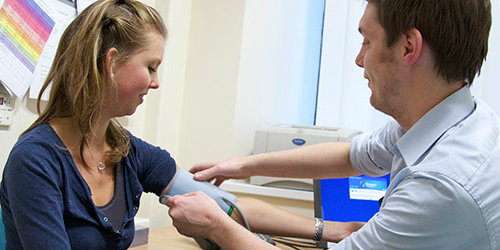IRIS training helps victims of domestic abuse
Training and support programme IRIS enables GPs to identify patients affected by domestic violence and abuse and refer them to specialist services, benefiting the patient and saving NHS resources.
A woman experiencing domestic violence and abuse will often go to her local general practice with a variety of symptoms that are not obviously connected to violence such as anxiety, depression and stress.
But because most GPs have had little or no training in how to identify patients affected by domestic violence, they often fail to recognise patients experiencing abuse and are uncertain about further care after disclosure.
A new training programme leads to up to six times more women receiving the help they need
A training and support programme developed by Professor Gene Feder and his colleagues at the School of Social and Community Medicine is changing this and has led to up to six times more women receiving the help they need.
Called Identification and Referral to Improve Safety (IRIS), the programme has now been commissioned by local authorities and Clinical Commissioning Groups and is running in 33 areas of England and Wales with training delivered to more than 450 practices.
Success of IRIS reflected in referrals
The current annual rate of referral of victims of domestic violence and abuse from IRIS practices in England and Wales to specialist domestic violence agencies is over 1,500 per year, with trial data indicating that at least 1,250 of these would not have taken place without the IRIS programme.
"Domestic violence and abuse is a major public health problem with serious health consequences and enormous costs to the NHS. IRIS provides a unique opportunity for primary care clinicians and their patients to talk about the issue. The way in which a primary care clinician approaches the subject with a patient can make an immense difference to that person's life and the lives of affected children. Ultimately the whole programme is to the benefit of patients, practices and practice teams." - Professor Feder
Making a real difference
One patient sums up the experiences of many women after consulting her GP, who had been trained using the IRIS programme: "I had been experiencing verbal, emotional and financial abuse from my husband for over 26 years. I felt sad, low and unable to cope. The doctor referred me to someone who could help... I don't need to go to the doctor's as much now and have cut down on the tablets I take for depression and sleeplessness. I have slowly got my freedom back and am so happy to be making my own decisions and planning my own way in life. This is not just for me, it's for my children and women like me out there. I feel empowered. I feel proud of me."
Benefitting the NHS as well as patients
As well as its impact on individual victims of domestic violence and abuse, the IRIS programme is having an economic impact on the NHS. With the current number of IRIS practices, the annual societal cost saving is estimated to be greater than £38 million. This estimate is based upon the results of the cost-effectiveness model developed from the trial outcomes.
"Domestic violence and abuse has a devastating public health, clinical and economic impact on women", said Prof Feder. "We know that referral to specialist domestic violence agencies result in a reduction of recurrence of domestic violence, improved quality of life and probably improved mental health of these women. We are proud of the impact our research has had on survivors of domestic violence and abuse and we hope this impact will be ongoing. We are now investigating the possibility of setting up a social enterprise company that will continue the work and enable the delivery of training to many more GPs."
Award winner
The project was the Policy and Practice category winner at the 2017 Vice-Chancellor's Impact Awards, which showcase the diverse and globally important contributions that University of Bristol research makes to society. The award recognised Prof Gene Feder, Medina Johnson and their colleagues 'for work to improve the primary healthcare response to domestic violence and abuse'.
More information
Related research centres
Related publications
- Primary care Identification and Referral to Improve Safety of women experiencing domestic violence (IRIS): protocol for a pragmatic cluster randomised controlled trial
- Cost-effectiveness of a system level intervention to improve the primary health care response to partner violence
- Domestic violence: knowledge, attitudes, and clinical practice of selected UK primary healthcare clinicians
- Responding to Domestic Violence in General Practice: A Qualitative Study on Perceptions and Experiences
Funders
 Study Social and Community Medicine
Study Social and Community Medicine
Apply your research to improving healthcare around the world.